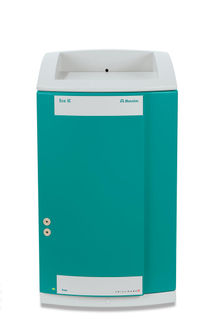To use all functions of this page, please activate cookies in your browser.
my.chemeurope.com
With an accout for my.chemeurope.com you can always see everything at a glance – and you can configure your own website and individual newsletter.
- My watch list
- My saved searches
- My saved topics
- My newsletter
Methanol economyThe methanol economy is a suggested future economy in which methanol replaces fossil fuels as a mean of energy storage, fuel and raw material for synthetic hydrocarbons and their products. It offers an alternative to the proposed hydrogen economy or ethanol economy. In 2005 Nobel prize winner George A. Olah advocated the methanol economy in an essay [1] and in 2006 he and two co-authors published a book around this theme [2] In these publications, they summarize the state of our fossil fuel and alternative energy sources, their availability and limitations before suggesting a new approach in the so called methanol economy. Methanol, is a fuel for heat engines and fuel cells. Due to its high octane rating it can be used directly as a fuel in cars (including hybrid and plug-in vehicles) using existing internal combustion engines (ICE). Methanol can also be used as a fuel in fuel cells, either directly in Direct Methanol Fuel Cells (DMFC) or indirectly after conversion into hydrogen by reforming. Methanol is a liquid under normal conditions, allowing it to be stored, transported and dispensed easily, much like gasoline and diesel fuel nowadays. It can also be readily transformed by dehydration into dimethyl ether, an diesel fuel substitute with a cetane number of 55. Methanol is already used today on a large scale (about 37 million tonnes per year)[3] as a raw material to produce numerous chemical products and materials. In addition, it can be readily converted in the methanol to olefin (MTO) process into ethylene and propylene, which can be used to produce synthetic hydrocarbons and their products, currently obtained from oil and natural gas. Methanol can be efficiently produced from a wide variety of sources including still abundant fossil fuels (natural gas, coal, oil shale, tar sands, etc.), but also agricultural products and municipal waste, wood and varied biomass. More importantly, it can also be made from chemical recycling of carbon dioxide. Initially the major source will be the CO2 rich flue gases of fossil fuel burning power plants or exhaust of cement and other factories. In the longer range however, considering diminishing fossil fuel resources and the effect of their utilization on earth's atmosphere, even the low concentration of atmospheric CO2 itself could be captured and recycled via methanol, thus supplementing nature’s own photosynthetic cycle. Efficient new absorbents to capture atmospheric CO2 are being developed, mimicking plant life’s ability. Chemical recycling of CO2 to new fuels and materials could thus become feasible, making them renewable on the human timescale.
Product highlight
SynthesisIn the methanol economy, methanol is synthesized:
Theoretical advantages over other energy storage mediaAdvantages over hydrogenMethanol economy advantages compared to hydrogen:
Methanol economy advantages compared to ethanol
Theoretical methanol economy disadvantages
See also
References
Categories: Fuels | Environmental chemistry |
|||
| This article is licensed under the GNU Free Documentation License. It uses material from the Wikipedia article "Methanol_economy". A list of authors is available in Wikipedia. |







